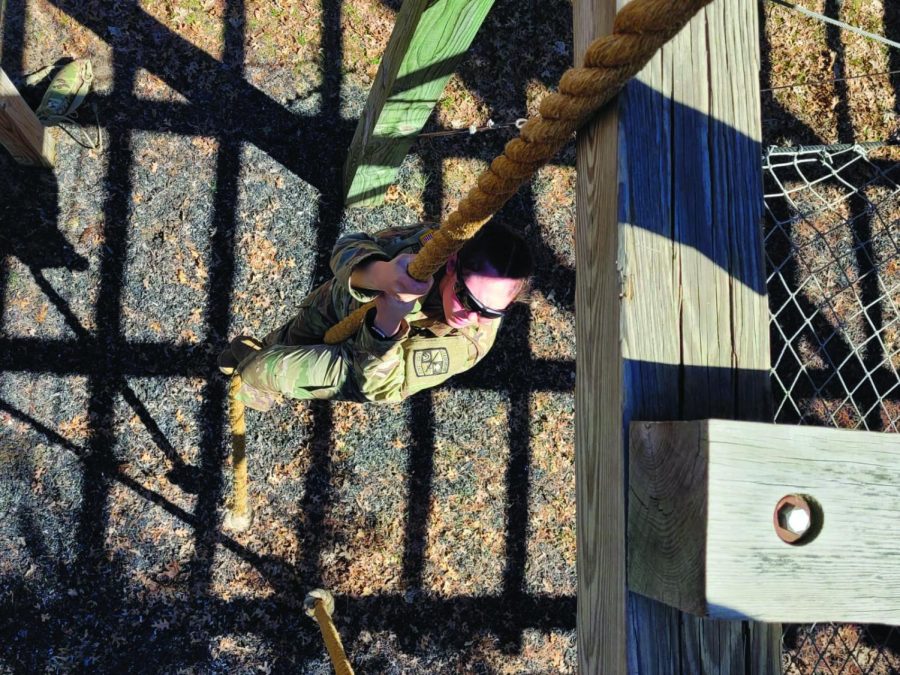Beyond the textbook: UW Oshkosh ROTC students taught skills that last a lifetime
Courtesy of Fox Valley Army ROTC Battalion – Cadet Emily Rivero ascends a rope as a part of the confidence obstacle course out at Fort McCoy.
April 20, 2023
Reserve Officers’ Training Corps (ROTC) teaches students lessons and leadership skills that far outweigh what can be taught in a standard classroom.
Members of the UW Oshkosh ROTC set off in Black Hawk helicopters flown in by the National Guard to take them from Oshkosh to Fort McCoy for CFTX (combined field training exercise).
Cadets (young trainees in the armed services) arrived on Wednesday and immediately put their skills to the test. The trainees participated in shooting range practice, obstacle courses and other evaluations.
UWO Cadet Emily Rivero said ROTC gave her the opportunity to represent her country whilst being a normal college student.
“From a young age, I’ve always looked up to a soldier in uniform,” Rivero said. “ROTC was able to give me a normal college student lifestyle as well as grant me all of these amazing opportunities in the military.”
CFTX is meant to prepare cadets for the summer of their junior year of college where they complete cadet summer training (CST). This 35-day training applies everything a cadet has learned the past three years of college and determines what branch of the military they will be assigned to.
Not only does the ROTC program help students afford their college education, but it works to develop character and life skills that can only be learned through experience that students work through first hand.
CST is meant to push participants to their limits mentally and physically, Cadet Christian Hecht said. Roughly 7,000 cadets from across the nation are sent to train at Fort Knox, Kentucky, each summer.
“It’s a test of willpower because you go in there thinking you’re prepared and you realize that you’re hopefully not,” Hecht said. “It forces you to quickly adapt and it will either make or break you. It’s meant to assess where cadets’ skills will be best utilized in the field.”
As a sophomore, Rivero has already competed in what is considered the hardest race in ROTC in February of this year.
The Northern Warfare is a 16.7 mile ruck [fast-paced walk with a 35lb bag on your back] through Grandad Bluff in La Crosse. One team of five cadets was sent from the Fox Valley Battalion to compete against teams all over the country, Rivero being one of five sent.
Oshkosh ROTC belongs to the Fox Valley Battalion, which consists of five schools: UWO, Marion University, Ripon College, St. Norbert College and UW Green Bay.
Rivero is also the only one from UWO who was selected for an air assault slot at Fort Campbell, Kentucky, this May where she will be taught how to repel from helicopters.
In their senior year, ROTC students are taught how to be an officer and assigned a platoon of 40 soldiers to be in charge of.
By the end of the first semester of senior year, they are assigned their branch of choice based on how well they were assessed at CST the summer before.
Upon graduation as an officer, Rivero said she hopes to go active duty in May of 2025 and into military intelligence.
“Military intelligence uses information collection and analyst approaches to provide commanders with intelligence that will allow them to make informed decisions on the battlefield,” Rivero said. “My job would be to collect intelligence on the enemy and provide assessments to assist combat units in planning their missions.”
Rivero said that ROTC has provided her with a multitude of experiences that will last far beyond her college years.
“I have an amazing academic support system and have made many lasting friendships,” Rivero said. “I personally like that if I want to have a career in the army, I can, and if I don’t, I can do it for a few years and become a civilian using my army training and leadership skills in the real world.”
The ROTC program positively impacts students’ lives and provides them with lessons that cannot be learned in a classroom. These lessons of leadership, discipline and accountability directly translate to the workforce.
Whether cadets choose to continue their lives in the military post-graduation or find work elsewhere, ROTC leaves an everlasting impact on the lives of those who partake in the program.
This can’t be derived from a textbook.














